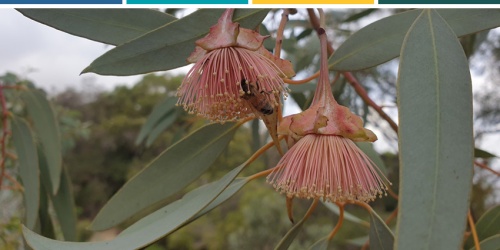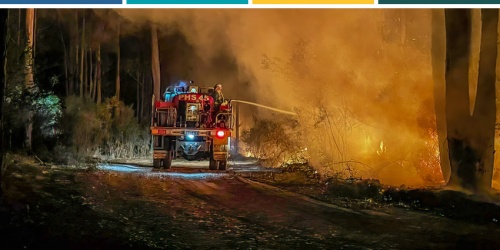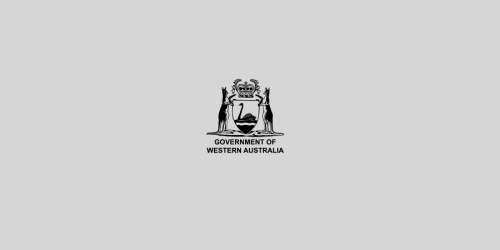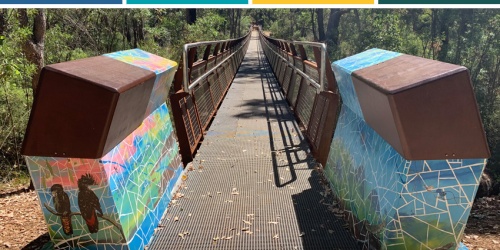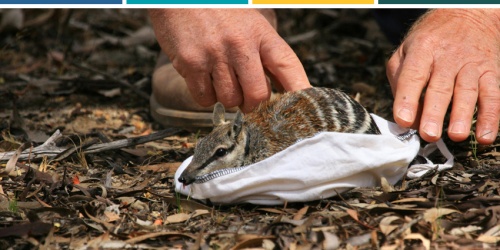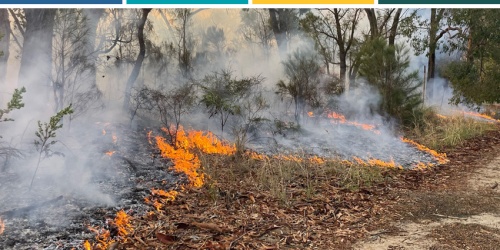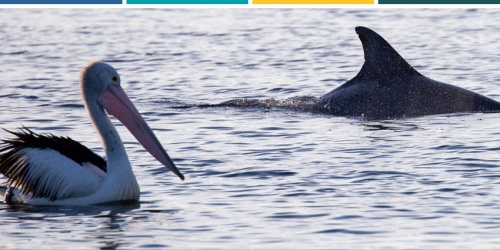
Financial statements
Refer to the Financial statements (DBCA Annual Report 2021-22 financial statements) document, in the Downloads section below.
Key performance indicators
Refer to the Key performance indicators (DBCA Annual Report 2021-22 KPIs) document, in the Downloads section below.
Ministerial directives
No Ministerial directives were received during the financial year.
Agency capability review
The department was one of the first three departments to participate in the Public Sector Commission’s Agency Capability Review Program (the Review). The Review commenced in September 2021 and ran through to June 2022. The Final Report will be released in 2022. The department recognises the valuable insights and observations provided through the Review and looks forward to continuing to implement strategies to ensure the department is a high performing public sector agency both now and into the future.
Government policy requirements
Substantive equality
The department implements the Policy Framework for Substantive Equality through the delivery of all services to and on behalf of the wider community. This is exemplified through the interrelationship between conservation management planning, reconciliation actions, workforce diversity and access and inclusion.
The department continues to build improved service delivery links with Aboriginal people across Western Australia and currently has 16 formal joint management partnerships with traditional owner groups. Additional proactive measures in 2021–22 that addressed both the Policy Framework, the department’s broader Reconciliation Action Plan (RAP) and the State Government’s Aboriginal Empowerment Strategy, included:
- Investing almost $1.3 million into Aboriginal procurement contracts.
- Supporting approximately 30 Aboriginal business operators to deliver tourism products in conservation areas.
- Achieving the highest to date representation of Aboriginal employees at the department, with 5.78 per cent of employees identifying as Aboriginal.
- Supporting the delivery of the initial $20 million of the Aboriginal Ranger Program, and facilitating the investment of another $50 million into Aboriginal organisations across the State, leading to the direct employment and training of traditional owners on country, and empowering communities.
- Progressing the PfOP initiative, which aims to deliver new Aboriginal joint management and employment opportunities through the addition of five-million hectares of land and water to the conservation estate over five years. In 2021–22, the department progressed 13 active Native Title negotiations.
- Completion of Aboriginal Cultural Awareness training by 2352 department employees.
- Increased use of Aboriginal knowledge, including through on-country science and research partnerships, to achieve improved biodiversity outcomes.
- Naming department-managed land and water and other conservation assets with culturally appropriate traditional language names.
Access-for-all principles guide the planning and design of recreation areas and facilities, which aim to provide equitable access opportunities to visitors, including people with disabilities and the aged. This is also reflected in the department’s Disability Access and Inclusion Plan 2021–25.
The department’s employment advertising includes a statement on substantive equality to maximise opportunities for improving the agency’s workforce diversity, by encouraging the recruitment of women, people with disability, Aboriginal people and people from culturally diverse backgrounds. The department’s Workforce and Diversity Plan 2021–25 ensures that the department can meet its service delivery commitments by building a productive, inclusive and diverse workforce.
Occupational health, safety and injury management
The department’s commitment to health, safety and wellbeing (HSW) is underpinned by a duty that is shared by managers, leaders, supervisors and employees to establish and implement appropriate management systems and practices. Accordingly, the HSW of employees, contractors, volunteers and the community, is integrated into the department’s core values and corporate planning processes.
The department’s Health, Safety, Wellbeing and Injury Management Framework provides a consistent and coordinated approach to the department’s ongoing HSW management. The Framework provides a structure to ensure all health and safety representatives, appointed safety officers and committees across the department are provided with a clear understanding of the department’s HSW strategic objectives, desired health and safety culture and mutual obligations for all employees, contractors and volunteers.
The department has seamlessly maintained compliance throughout the transition to the new Work Health and Safety (WHS) Act 2020 and WHS Regulations (General) 2022 that came into effect on 31 March 2022. Safety officers and health and safety representatives played a key role in supporting the department through the legislative transition, while promoting a strong HSW culture at a broader level.
To maintain and enhance a mentally healthy workplace with an impactful, internal support network, a range of wellbeing services were made available to employees including access to the Peer Support Network, Critical Incident Peer Responders, Chaplaincy Services and the Employee Assistance Program. Additionally, the department provided further opportunities for employees to undertake Mental Health First Aid and De-escalation Skills training.
During 2021–22, key achievements included:
- Commenced process to upgrade online health, safety and wellbeing management system.
- Engaged an external contractor to undertake an Injury Management Framework review and commenced implementing a range of recommendations across the department.
- Developed and refined the Fire Fitness for Work standards.
- Developed and implemented alcohol testing training and information sessions for employees.
- Implemented asbestos awareness training for employees, contractors and volunteers in alignment with the National Strategic Plan for Asbestos Awareness and Management.
- Awarded Gold Status certification with Mental Health First Aid Australia with an additional 114 employees trained in Mental Health First Aid.
- Introduced de-escalation training sessions for frontline employees.
- Employees participated in the trial of a new Black Dog Institute wellbeing mobile app for emergency service workers.
Table 14: Health and safety performance indicators
| Measure | Results – prior years | Current reporting year | Results against target | ||
|---|---|---|---|---|---|
| 2019–20 | 2020–21 | 2021–22 | Target | Comment on result | |
| Number of fatalities | 0 | 0 | 0 | 0 | Achieved |
| Lost time injury and/or disease incidence rate | 3 | 2.7 | 3 | 0 or 10% reduction | Not achieved |
| Lost time injury and/or disease severity rate | 6.8 | 11 | 1.2 | 0 or 10% reduction | Achieved |
| Percentage of injured workers returned to work: | |||||
| (i) within 13 weeks | 95% | 88% | 88% | Greater than or equal to 80% | Achieved |
| (ii) within 26 weeks | 98% | 95% | 100% | Achieved | |
| Percentage of managers trained in occupational safety, health and injury management responsibilities | <80% | 34% | 49% | Greater than or equal to 80% | Not achieved |
Board and committee remuneration
The remuneration rates for boards and committees that assist the department are disclosed below.
Table 15: Animal Ethics Committee (Biodiversity, Conservation and Attractions)
| Position | Name | Type of remuneration | Period of membership | Gross/actual remuneration ($) |
|---|---|---|---|---|
| Chair | Juanita Renwick | Not eligible for remuneration | 01/07/21 to 30/11/21 | $ - |
| Chair | Martin Dziminski | Not eligible for remuneration | 01/12/21 to 30/06/22 | $ - |
| Member | Category A | Sessional | 01/07/21 to 30/06/22 | $1,798.00 |
| Member | Category D | Sessional | 01/07/21 to 30/06/22 | $1,750.00 |
| Member | Category C | Sessional | 01/07/21 to 30/06/22 | $1,750.00 |
| Member | Category A | Sessional | 04/08/21 to 30/06/22 | $1,750.00 |
| Member | Category A | Sessional | 01/07/21 to 19/08/22 | $350.00 |
| Member | Category D | Sessional | 01/07/21 to 30/06/22 | $2,100.00 |
| Member | Category C | Sessional | 01/07/21 to 30/06/22 | $2,137.00 |
| Member | Category B | Sessional | 01/07/21 to 28/02/22 | $ - |
| Member | Category B | Sessional | 01/04/22 to 30/06/22 | $ - |
| Member | Category B | Sessional | 01/07/21 to 30/06/22 | $ - |
| Total (Members not identified by name due to privacy reasons) |
$11,635.00 | |||
| Categories: A Veterinarian, B Scientist, C Animal Welfare, D Independent community representative, E Other | ||||
Table 16: Conservation and Parks Commission
| Position | Name | Type of remuneration | Period of membership | Gross/actual remuneration ($) |
|---|---|---|---|---|
| Chair | Christopher Doepel | Fortnightly | 01/07/21 to 30/06/22 | $40,570.00 |
| Deputy Chair | Jo-anne Lanagan | Fortnightly | 01/07/21 to 30/06/22 | $25,538.00 |
| Member | Penny Bond | Fortnightly | 01/07/21 to 30/06/22 | $19,427.00 |
| Member | Tahn Donovan | Fortnightly | 01/07/21 to 30/06/22 | $19,427.00 |
| Member | Kim Eckert | Fortnightly | 01/07/21 to 30/06/22 | $19,427.00 |
| Member | Alan Walker | Fortnightly | 01/07/21 to 17/09/21 | $4,483.00 |
| Member | John Keesing | Not eligible for remuneration | 01/07/21 to 30/06/22 | $ - |
| Total | $128,872.00 |
Table 17: Ningaloo Coast World Heritage Advisory Committee
| Position | Name | Type of renumeration | Period of membership | Gross/actual renumeration ($) |
|---|---|---|---|---|
| Chair | Regina Flugge | Sessional | 01/07/21 to 30/06/22 | $1,312.00 |
| Member | Rachael Cooyou | Sessional | 01/07/21 to 30/06/22 | $5,228.74 |
| Member | Russel Babcock | Sessional | 01/07/21 to 30/06/22 | $ - |
| Member | George Kailis | Sessional | 31/05/22 to 30/06/22 | $858.00 |
| Member | James Florrison | Sessional | 20/12/21 to 30/06/22 | $858.00 |
| Member | Jacqeline Hine | Sessional | 01/07/21 to 30/06/22 | $858.00 |
| Member | William Humphreys | Sessional | 01/07/21 to 30/06/22 | $858.00 |
| Member | Vicki Long | Sessional | 01/07/21 to 30/06/22 | $858.00 |
| Member | Hazel Walgar | Sessional | 01/07/21 to 30/06/22 | $858.00 |
| Total | $11,688.74 |
Table 18: North West Shelf Flatback Turtle Conservation Program Advisory Committee and Scientific Panel
| Position | Name | Type of renumeration | Period of membership | Gross/actual renumeration ($) |
|---|---|---|---|---|
| Chair | Lyn Beazley | Sessional | 01/07/21 to 30/06/22 | $ - |
| Member | Rory Mcauley | Not eligible for remuneration | 08/06/22 to 30/06/22 | $ - |
| Member | Narelle Montgomery | Not eligible for remuneration | 01/07/21 to 30/06/22 | $ - |
| Member | Andrew Smith | Not eligible for remuneration | 01/07/21 to 30/06/22 | $ - |
| Total | $ - |
Table 19: Purnululu World Heritage Area Advisory Committee
| Position | Name | Type of renumeration | Period of membership | Gross/actual renumeration ($) |
|---|---|---|---|---|
| Chair | Glen Chidlow | Not eligible for remuneration | 01/07/21 to 30/06/22 | $ - |
| Member | Paul Butters | Sessional | 01/09/21 to 30/06/22 | $1,424.00 |
| Member | Sarah Legge | Sessional | 01/07/21 to 30/04/22 | $429.00 |
| Member | Cherylene Nocketta | Sessional | 01/07/21 to 30/04/22 | $1,424.00 |
| Member | Josephine Drill | Sessional | 01/07/21 to 30/04/22 | $2,270.00 |
| Member | Vincent Edwards | Not eligible for remuneration | 01/07/21 to 30/06/22 | $ - |
| Member | Eldride Edwards | Sessional | 01/07/21 to 30/06/22 | $ - |
| Member | Bonnie Edwards | Sessional | 01/07/21 to 30/06/22 | $ - |
| Member | Peter Backshall | Sessional | 01/09/21 to 30/06/22 | $1,141.00 |
| Total | $6,688.00 |
Table 20: Shark Bay World Heritage Advisory Committee
| Position | Name | Type of remuneration | Period of membership | Gross/actual remuneration ($) |
|---|---|---|---|---|
| Chair | Phillip Scott | Sessional | 01/07/21 to 30/06/22 | $1,312.00 |
| Member | Anthony Bellottie | Sessional | 01/07/21 to 30/06/22 | $429.00 |
| Member | David Newsome | Sessional | 01/07/21 to 30/06/22 | $429.00 |
| Member | Janine Guenther | Sessional | 01/07/21 to 30/06/22 | $429.00 |
| Member | Elisabeth Mclellan | Sessional | 01/07/21 to 30/06/22 | $429.00 |
| Member | Juliane Bush | Sessional | 01/07/21 to 30/06/22 | $1,909.00 |
| Member | Laura Gray | Sessional | 01/07/21 to 30/06/22 | $858.00 |
| Member | Diana Walker | Sessional | 01/07/21 to 30/06/22 | $858.00 |
| Member | Elizabeth Mattiske | Sessional | 01/07/21 to 30/06/22 | $858.00 |
| Total | $7,511.00 |
Table 21: Swan River Trust Board
| Position | Name | Type of remuneration | Period of membership | Gross/actual remuneration ($) |
|---|---|---|---|---|
| Chair | Hamish Beck | Fortnightly | 01/07/21 to 30/06/22 | $15,865.00 |
| Deputy Chair | Dr Joanna Pearce | Fortnightly | 01/07/21 to 30/06/22 | $9,520.00 |
| Member | Peter King | Sessional | 23/07/21 to 30/06/22 | $2,421.00 |
| Member | Vanessa Martin | Sessional | 01/07/21 to 30/06/22 | $2,421.00 |
| Member | Jo Wilkie | Sessional | 01/07/21 to 30/06/22 | $2,421.00 |
| Member | Marenée Provost | Sessional | 01/07/21 to 30/06/22 | $2,421.00 |
| Member | Cr Sara Saberi | Sessional | 01/07/21 to 30/06/22 | $2,690.00 |
| Member | Jacquie Stone | Not eligible for renumeration | 01/07/21 to 30/06/22 | $ - |
| Total | $37,759.00 |
WA Multicultural Policy Framework
The department’s Workforce and Diversity Plan 2021–25 (the Plan) was developed in accordance with the Equal Opportunity Act 1984 and the Public Sector Commission’s Workforce Diversification and Inclusion Strategy for Public Sector Employment 2020–25. It is guided by the department’s RAP, Women in Fire Management Action Plan 2019–22, Disability Access and Inclusion Plan and the Western Australian Multicultural Policy Framework.
The Plan outlines strategies for achieving and fostering a diverse and inclusive workforce, including strategies to improve the representation of culturally and linguistically diverse people in the department’s workforce, promote their inclusion and reduce discrimination against them.
During 2021–22, key achievements included:
- Promoting Harmony Week events and raising awareness of the United Nations International Day for the Elimination of Racial Discrimination.
- Providing employees with access to the SBS Core Inclusion online course, which raises awareness of bias and discrimination and promotes building a workplace and community that is diverse, inclusive and fair for everyone.
- Ensuring employees complete the department’s Workplace Discrimination and Harassment course every five years.
- Commencing the development of a dedicated Aboriginal Employment Action Plan.
- Promoting internal and external Reconciliation Week and NAIDOC week events to staff and members of the public.
Other legal requirements
Treasurer’s Instruction 953 – publication and presentation of annual estimates
In accordance with Treasurer’s Instruction 953, the 2022–23 annual estimates for the department are published in the 2021–22 annual report. Actual results will be reported against these estimates in the 2022–23 annual report.
Download the 2022-23 annual estimates (PDF 107KB).
Unauthorised use of credit cards
There were 89 personal transactions charged to departmental credit cards by 76 different cardholders to 30 June 2022. The majority of these occurred due to the cardholder inadvertently using their departmental credit card instead of a personal credit card for small transactions where a PIN was not required, or a merchant’s online payment facilities defaulting to the departmental credit card details that were provided on a previous occasion.
In each case, the cardholder provided written advice to their cost centre manager, the chief finance officer and the Notifiable Authority, of the personal use of a departmental credit card, consistent with the requirements of Treasurer’s Instruction 321.
Table 22: Unauthorised use of credit cards
| Financial Year | 2021–22 |
|---|---|
| Aggregate amount of personal use expenditure for the reporting period | $5,418.57 |
| Aggregate amount of personal use expenditure settled by the due date (within 5 working days) |
$5,418.57 |
| Aggregate amount of personal use expenditure settled after 5 working days |
N/A |
| Aggregate amount of personal use expenditure outstanding at balance date |
$0.00 |
Advertising, market research, polling and direct mail
In accordance with section 175ZE of the Western Australian Electoral Act 1907, the department incurred the following expenditures in advertising.
| Total expenditure for 2021–22 was: | $222,729.38 |
|---|---|
| Expenditure has occurred in the following areas: | |
| Advertising agencies - recruitment | |
| Initiative Media Australia Pty Ltd | $64,132.82 |
| Direct mail organisations | NIL |
| Market research organisations | NIL |
| Media advertising organisations | $158,596.56 |
| A.R.M Marketing Pty Ltd | 1140.00 |
| Albany & Great Southern Weekender | 270.00 |
| Andimaps | 1202.73 |
| Aurora Magazine | 518.18 |
| Aussi Drawcards | 210.00 |
| Aviation Trader | 250.00 |
| Carat Australia Media Services Pty Ltd | 80,096.31 |
| Collie Chamber Commerce | 1000.00 |
| Concept Media | 349.20 |
| Countrywide Publications | 1818.18 |
| Denmark Bulletin | 2018.18 |
| Denmark Chamber of Commerce | 386.36 |
| Department of Planning, Lands and Heritage | 2749.72 |
| Department of the Attorney General - State Solicitors Office | 960.00 |
| Esperance Tide | 2485.45 |
| 616.36 | |
| Fremantle Herald | 220.00 |
| Initiative Media Australia Pty Ltd | 48,648.27 |
| Lizart Productions Trading as East Kimberley Directory | 72.73 |
| Nextmedia Pty Ltd | 1650.00 |
| Premium Publishers | 364.00 |
| Southerly Magazine | 825.00 |
| State Law Publisher | 6849.89 |
| Walpole Community Resource Centre | 3146.00 |
| Walsh Media | 750.00 |
Disability access and inclusion plan outcomes
The department’s Disability Access and Inclusion Plan 2021–25 (DAIP) is monitored by the department’s Diversity and Access Committee, which includes representatives from across the department, including the statutory authorities.
As a major provider of outdoor recreation locations and facilities in natural areas, the department ensures all site plans consider access requirements and are developed in accordance with Corporate Policy Statement No 18 Recreation, Tourism and Visitor Services. In all circumstances, appropriate accessibility is implemented and where it is unachievable, alternative opportunities that enable interaction with the location, experience or environment are developed.
During 2021–22, accessible paths were built at the Goat Farm in Greenmount National Park. Other projects completed include new and improved facilities at Shell Beach in Shark Bay World Heritage area, upgraded river access at Honeymoon Pool in Wellington National Park and boardwalk replacements at Lake Goegrup and Olive Seymour in Herdsman Lake. Significant progress has been made on the accessible floating dock at Danggu (Geikie Gorge) National Park.
The 2021 election commitment of $2 million for the Accessible Parks WA initiative has commenced with four components:
- Incorporation of disability access information into the Explore Parks WA website.
- A partnership was established with Break the Boundary to develop in-park access experiences for visitors with disabilities.
- The launch of the Every Kid in a Park project in partnership with Nature Play WA to connect children with disability to the Western Australian conservation estate.
- Visitor access infrastructure improvements in parks for visitors with a disability.
The department continues to run numerous initiatives and activities in line with the DAIP. These include:
- Undertaking Disability Confident Recruiter status renewal for 2021–22.
- Using a nationally agreed system of bushfire alerts and warnings.
- Partnering with the National Disability Services WA Building the Talent Pool Project to implement strategies to increase employment of people with disability, including a five per cent employment target for people with disability.
- Ensuring employees have the capability to support candidates with disability by providing disability awareness information in Selection Panel Training (in 2021–22, 43 employees attended the training).
- Improving employee awareness of diversity and inclusion through the SBS Core Inclusion Program (82 employees have completed the program since its release in September 2021).
- Employing people with disability on fee-for-service contracts through Western Australian Disability Enterprises, which currently include Activ Foundation, Intelife and Westcare.
- Using a range of disability recruitment specialists and continuing to email all advertised positions to recruitment agencies.
- Ensuring events, building reception areas and parking facilities are accessible to people with disability and monitoring and addressing complaints about access.
- The commencement of work on a diversity dashboard that aims to increase awareness of diversity initiatives, drive their implementation and improve outcomes for diversity employment, including people with disability.
- Ensuring the department’s website continues to meet contemporary best practice and applicable legislative requirements for access for people with disability, and that departmental information is available in alternative formats.
Compliance with public sector standards and ethical codes
Under section 31 of the Public Sector Management Act 1994, the department is required to report on its compliance with public sector standards and ethical codes.
Table 23: Compliance with public sector standards and ethical codes
| Compliance issue | Significant action taken to monitor and ensure compliance |
|---|---|
| Public Sector Standards | |
| One breach claim was lodged in 2021–22. The breach claim was submitted against the Employment Standard. The breach claim was resolved internally and was subsequently withdrawn. | The department’s PSB intranet site includes information on the Public Sector Standards, including a link to the Public Sector Commission website. Policies and guidelines relevant to the standards are also available on the PSB intranet site. The online Accountable and Ethical Decision Making course and the department’s Selection Panel Training course also provide information about Public Sector Standards. |
| The department’s Code of Conduct and Public Sector Code of Ethics | |
| A total of 57 suspected breach of discipline processes were undertaken across the department in 2021–22. All were suspected to have breached the department’s Code of Conduct and the Public Sector Code of Ethics, as prescribed by Commissioner’s Instruction No. 7 Code of Ethics.
Of the 57 allegations, 45 were related to non-compliance with COVID-19 vaccination requirements. Twenty-two of those were finalised in Of the 12 non-COVID-19 vaccination related discipline processes, six were finalised in 2021–22. All allegations carried over from 2020–21 have been finalised. |
The Public Sector Code of Ethics is currently contained within the department’s Code of Conduct. Therefore, a breach of the Code of Ethics is also a breach of the Code of Conduct. However, a breach of the Code of Conduct is not automatically a breach of the Code of Ethics.
In September 2021, the department released its Corporate Values Charter and online Integrity Hub. The values help support employees understanding the lens through which to make decisions and conduct themselves. The Integrity Hub is a place for employees and managers to access important information on workplace behaviour requirements, training, practical steps on dealing with integrity issues, wellbeing support services and important news items and stories. An internal Integrity Committee was appointed to action the department’s Integrity Implementation Plan, which is closely aligned to the Integrity Strategy for WA Public Authorities 2020–23. All employees are required to read and sign the Code of Conduct as part of the induction process or when a significant review occurs. Further, the document includes a section on how employees can report breaches of the Code of Conduct. The department ensures compliance with the Code of Conduct through quarterly reporting to all divisions, on completion of the signed acknowledgment page. The Code of Conduct is also included in the induction program for new starters and in the mandatory Accountable and Ethical Decision Making Training which employees are required to complete every five years. Intermittent reminders are also sent to employees via Broadcast emails to remind them of their obligations and the requirement to sign the Code of Conduct. To manage COVID-19 related compliance matters, the department developed a COVID-19 Mandatory Vaccination for Employees and Contractors protocol and included regularly updated frequently asked questions to assist employees and managers. In addition, the department provided regular updates to employees via Broadcasts and amendments to the COVID-19 intranet page to ensure everyone remained informed about changes that impacted them. |
Recordkeeping plans
As required under section 19 of the State Records Act 2000 (the Act), the department has an approved Recordkeeping Plan. This is supported by policy, procedures and training to ensure compliance with the Act. Completion of an e-learning course covering the legislative and policy framework for recordkeeping is a mandatory induction requirement for all new employees, including temporary employees and contractors. In addition, employees who have successfully completed the recordkeeping awareness induction training are required to complete the refresher module every five years, ensuring the program continues to be effective. The department is continuing to work towards a more digitally-focused recordkeeping environment to support business outcomes and deliver better services.
